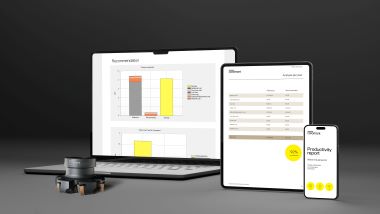
Importance Of Measuring Manufacturing Sustainability
Patrik Eurenius, Head of Sustainability and EHS at metal cutting tools and manufacturing solutions expert Sandvik Coromant, explains the importance of measuring manufacturing sustainability as the company launches its new analyser tool.
Historically, the way that companies measure sustainability has been subject to accusations that it is fluff rather than fact. That’s because, in the past, metrics haven’t been held in the same regard as other business metrics, such as financial data. But that’s all set to change.
At the UN’s COP28 climate conference in 2023, world leaders debated what an agreement to end the use of fossil fuels could look like. In the end, it was agreed the world would work towards “transitioning away from fossil fuels in energy systems in a just, orderly and equitable manner”.
While a step away from initial discourse around the complete ‘phasing out’ of fossil fuels, the very inclusion of fossil fuels in net zero plans was seen as a landmark moment. Accounting for one-fifth of global carbon emissions and 54% of the world’s energy usage, tackling fossil fuel reliance in the manufacturing and production sector will undoubtedly support global environmental goals.
The Detail Is In The Data
Businesses that focus on sustainability tend to see great rewards. Embedding metrics such as waste generation, carbon emissions and energy usage into business strategy is essential to meeting customer demand, regulatory requirements and investor preferences.
An emphasis on sustainability has also been proven to attract top talent, reduce costs and boost financial profits. However, despite its benefits, businesses still struggle to showcase their credentials. Research published by the World Economic Forum revealed that, while 90% of executives believe sustainability is important, only 60% of organisations have sustainability strategies in place.
What’s the biggest sticking point? To paraphrase Drucker, what’s not being measured, simply cannot be improved upon. To reduce reliance on fossil fuels, tackle greenhouse gas emissions and limit the production of waste, manufacturers need access to the right data.
Read more here at page 16
What You Missed:
Power Of Industry 4.0 Unlocked At METALTECH & AUTOMEX 2024
AI Has Crept Its Way Into Aerial Combat
Tesla Profits Decline By More Than 50% In Q1 2024
Tesla Reduces Full Self-Driving Software Price To US$8,000
Researchers Turn Metal Waste Into Catalyst For Hydrogen
Is AI Is Looking More Like A Band Aid Now?
Rever Automotive Builds And Tests BYD Buses In Thailand
Tesla Cuts More Than 10% Of Its Workforce
Tesla Settling Lawsuit Erodes Faith In Autonomous Driving
IoT Offers A Wealth Of Opportunities
WANT MORE INSIDER NEWS? SUBSCRIBE TO OUR DIGITAL MAGAZINE NOW!
CONNECT WITH US: LinkedIn, Facebook, Twitter
Letter to the Editor
Do you have an opinion about this story? Do you have some thoughts you’d like to share with our readers? APMEN News would love to hear from you!
Email your letter to the Editorial Team at [email protected]
